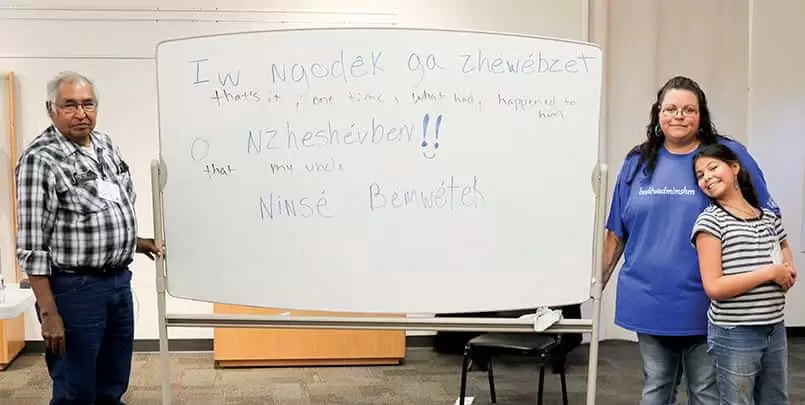
Bodéwadmimwen Mawjeshnowen 2016 took place at the Citizen Potawatomi Nation Cultural Heritage Center on Wednesday, July 27 – 29, 2016, in Shawnee, Okla. Presenters from the different Potawatomi bands spoke on various topics, including “Comprehensible input through immersion”, “Lifestyles, diet and common feasts”, “Old Songs”, “Neshnabé Odanen”, “75 verbs to revitalization”, “Corn bracelet making with youth”, “Stories from childhood”, “Overcoming obstacles”, “Creation of zisbakwet mkek”, “Gwi-Tadimen”, “Children’s games”, and “Obviatives within a story”. Forest County Potawatomi tribal elder Jim Thunder presented “Obviative within a story” with the help of his mentee, Carla Collins, a member of the Pokagon Potawatomi Band from Dowagiac, Mich.
To teach his language sessions, a true and funny story was told about Thunder’s brother-in-law, Ed Tahwa, who owned a Model A back in the 50s that was on its last leg. It was typed up in 32 Potawatomi sentences with the English translations below each one. Every attendee received a copy to follow as Thunder read the sentences individually with Collins breaking each one apart into the English meaning. Also, a circle was drawn for most sentences and the audience was asked to state the obviative within that message.
To sum up the story, Tahwa took his son, Louis Thunder, for a ride in his Model A where the brakes did not work and the gears and transmission were all messed up. When they arrived at the top of a big hill by the Wabeno High School, the car quit. So they walked down the hill to Cheney’s Garage to get a mechanic to tow the car.
Upon getting to the broken-down car, L. Thunder was still in the tow truck and Tahwa got into the broken-down Model A. The mechanic decided to give the car a push instead to get it to the garage. Nobody had told him there were no brakes or gears in it!
Tahwa rolled quickly down the hill as L. Thunder told the mechanic the car won’t stop. “Oops,” was his reply! They both laughed as Tahwa was “driving like hell”. As he approached the intersection, Tahwa suddenly swerved onto Main Street and was tilted on
two wheels. It looked as if the Model A was going to tip over. But he got it straightened out and coasted into the garage!
This was a good story to hear told in the Potawatomi language and then translated into English. J. Thunder and Collins did an excellent job fielding questions from the audience. It appeared that many of them had a basic, if not advanced, understanding of the language already.
But one who is a beginner may wonder, “What is an obviative?” In an interview with Potawatomi Traveling Times (PTT) on the second day of the language conference, Thunder explained that it has to do with animate and inanimate objects within the circle. When the animate object falls out of the circle, then an inanimate term is used for the animate object or person. “This is one of the more difficult parts of the language to learn,” stated Thunder.
Thunder uses “the traditional system written by the old-timers”, he stated. All the old documents were written in that way. He added, “People never went to school but could write the language.” His father is an example of this.
Thunder went to school through the ninth grade and always spoke two languages. “All the Thunders were fluent,” he said. He is concerned with the language being in danger of dying out. “We were told to keep the language,” he recalled. “Our ceremonies were meant to be carried out in our language and not English,” he emphasized.
In trying to save the Potawatomi language and culture, Thunder currently assists whenever he can with requests. At 80 years of age, Thunder still holds language classes twice a week on the Forest County Potawatomi reservation and has language contracts with Hannahville and Pokagon Potawatomi.
Two of his daughters, Jessica and Leigh Jennifer Thunder (and family), were at the Potawatomi language conference as attendees. Leigh assisted at her dad’s workshop with writing the next Potawatomi sentence on the back of the board while her dad and Collins were translating the sentence on the front of the board. “I can read, write and even transcribe [the Potawatomi language], but I do not speak it,” Leigh admitted.
Jessica, in contrast, can speak basic introductions. Both daughters, though, showed much pride in their father in all he does to carry on the language. “He is funny and humble and does not take himself too seriously, which is refreshing,” stated Jessica when PTT asked her to describe her dad.
Not only is Thunder a role model to his family but to many Potawatomi people. As Justin Neely, Citizen Potawatomi Nation Director of Language stated, “Jim is the first person I learned the language from. I got all of his tapes… he has been a real inspiration and a guiding force… he is a true inspiration. He is a great guy with so much information traditionally… he is one-of-a-kind!”
If anyone is interested in learning the Potawatomi language, Jim Thunder has classes at the Forest County Potawatomi Cultural Center & Museum, every Tuesday and Wednesday, 10 a.m. – noon.
